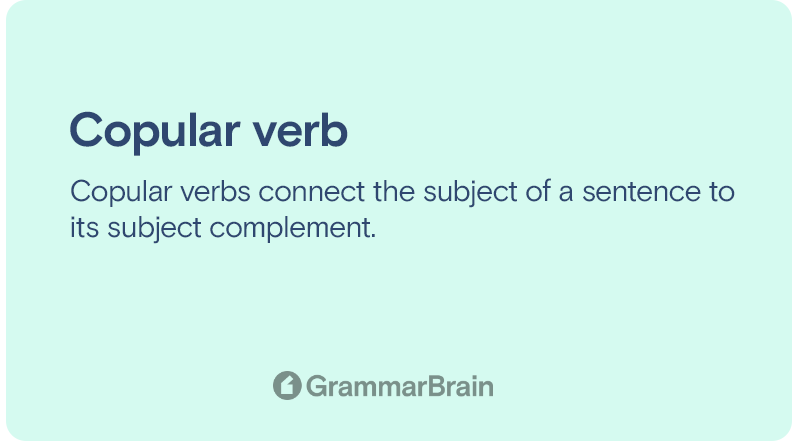What are copular verbs? Verbs play a very important role in any writing as they describe the actions that the subject of a sentence is doing. Some of the most used verbs include words like is, am, and being. But these are copular verbs rather than regular verbs. Let’s look at copular verbs in detail.

What are copular verbs?
Copular verbs connect the subject of a sentence to its subject complement. They are vital when it comes to sentence structure.
Definition
A copular verb is defined as a verb that links the subject and its predicate. The subject being linked is usually a noun or an adjective. Such copular verbs tell us that the subject and the predicate are similar, or they describe some quality of the subject.
For example:
- Roy is American
- Roy is my brother
In the second sentence, the copular verb “is” establishes that Roy and my brother are the same people. The first sentence, on the other hand, tells that Roy has the quality of being American. Typically, adjectives come after copular verbs instead of adverbs.
Difference between regular verbs
Copular verbs describe the state of the subject. They tell us that the subject is in a particular state of being. Regular action verbs, on the hand, tell us about some particular action that the subject is doing.
Copular verb sentence example
To understand copular verbs and how they work, look at the following sentences:
- Anit is sad
- Anit was depressed
Here, the copular verb connects the subject, Anit, and what they are feeling or experiencing, sad or depressed.
Some other examples of copular verbs are:
- My brother is strong
- Michelle seems happy now that she’s in college
- Cooking looks easy in a video
- Hagrid is a wizard
- Luffy is impatient
- The cook’s food tastes delicious
- She is a navigator
Copular verb grammar rules
The subject complement comes after a copular verb to specify or define the subject. It can be a word, a phrase, or a clause. They can either be a noun while identifying a subject or an adjective while describing a subject.
Subject to a subject complement
A copular verb connects the subject of a sentence, described by a noun or a pronoun, to the subject complement. The subject complement tells us more about the subject, as an adjective or a noun.
Example for an adjective and a noun as the subject complement
Take the following examples:
- Dany’s answer is chaos!
Here, “chaos” is the subject complement, and it is a noun.
- Jon is a future commander.
Here, “future commander” is the subject complement, and it is a noun phrase that identifies the subject.
- Arya seems sad.
Here, “sad” is the subject complement, and it is an adjective that describes the subject.
- Your food tastes too salty to me.
Here, “too salty” is the subject complement, and it is an adjective phrase that describes the subject.
Difference between action verbs and copular verbs
Copular verbs tell us what the subject is. Adjectives can alter such verbs. Adjectives often follow a copular verb in a sentence. Action verbs describe an activity or an action. They come along with adverbs. Adverbs are often seen after a regular action verb.
Examples of copular verbs and actions verbs
Consider the following sentences.
- Rick was careful on the way home.
Here, “was” is the copular verb, and the adjective “careful”, follows it.
- Rick drove carefully on the way home.
Here, “drove” is an action verb that describes what our subject, “Rick”, is doing. The adverb “carefully” follows it.
Why are copular verbs important?
Adverbs tend to follow verbs and modify them. However, if the verb in question is a copular verb, then adverbs should not be used. Instead, subject complements should be adjectives or nouns. Using an adverb with a copular verb is grammatically wrong. For example:
- The pizza tastes amazing!
- The pizza tastes amazingly!
The second sentence is wrong. “Amazingly” is an adverb, and instead, we should use the adjective “amazing.”
Copular verb list
Some common copular verbs are:
- act
- be
- remain
- appear
- become
- look
- bleed
- turn up
- become
- taste
- come
- stay
- come out
- sound
- constitute
- smell
- end up
- shine
- die
- seem
- get
- run
- go
Conclusion
Now you know all that there is to know about copular verbs! These words are used extensively in the English language, and people may confuse them with regular verbs. It is important to understand how they are different and how they can be used in a sentence. This helps in making your writing smoother and easy to follow.
FAQs
How do you identify a copular verb?
A copular verb indicates that a subject and its addition are synonymous. Such a word suggests that the subject possesses the quality indicated by the compliment.
What distinguishes auxiliary verbs from copular verbs?
The main subject of the sentence and the supporting clause can use copular verbs. Copular verbs work independently in the same way as main verbs. This is in contrast to auxiliary verbs, which are also known as assisting verbs. Such auxiliary verbs are kept in front of other verbs.
What does “copula” mean?
A copula is something that links two things. The copular verb links the subject and the subject complement.
Are copular verbs finite?
Copular verbs are still regarded as finite verbs even though they diverge from action verbs. Accordingly, only a single copular verb may be there in each phrase.
What are common copular verbs?
Are linking verbs and copular verbs the same?
No. Linking verbs and copular verbs, while similar, are not the same.
Inside this article
Fact checked:
Content is rigorously reviewed by a team of qualified and experienced fact checkers. Fact checkers review articles for factual accuracy, relevance, and timeliness. Learn more.
Core lessons
Glossary
- Abstract Noun
- Accusative Case
- Anecdote
- Antonym
- Active Sentence
- Adverb
- Adjective
- Allegory
- Alliteration
- Adjective Clause
- Adjective Phrase
- Ampersand
- Anastrophe
- Adverbial Clause
- Appositive Phrase
- Clause
- Compound Adjective
- Complex Sentence
- Compound Words
- Compound Predicate
- Common Noun
- Comparative Adjective
- Comparative and Superlative
- Compound Noun
- Compound Subject
- Compound Sentence
- Copular Verb
- Collective Noun
- Colloquialism
- Conciseness
- Consonance
- Conditional
- Concrete Noun
- Conjunction
- Conjugation
- Conditional Sentence
- Comma Splice
- Correlative Conjunction
- Coordinating Conjunction
- Coordinate Adjective
- Cumulative Adjective
- Dative Case
- Determiner
- Declarative Sentence
- Declarative Statement
- Direct Object Pronoun
- Direct Object
- Diction
- Diphthong
- Dangling Modifier
- Demonstrative Pronoun
- Demonstrative Adjective
- Direct Characterization
- Definite Article
- Doublespeak
- False Dilemma Fallacy
- Future Perfect Progressive
- Future Simple
- Future Perfect Continuous
- Future Perfect
- First Conditional
- Irregular Adjective
- Irregular Verb
- Imperative Sentence
- Indefinite Article
- Intransitive Verb
- Introductory Phrase
- Indefinite Pronoun
- Indirect Characterization
- Interrogative Sentence
- Intensive Pronoun
- Inanimate Object
- Indefinite Tense
- Infinitive Phrase
- Interjection
- Intensifier
- Infinitive
- Indicative Mood
- Participle
- Parallelism
- Prepositional Phrase
- Past Simple Tense
- Past Continuous Tense
- Past Perfect Tense
- Past Progressive Tense
- Present Simple Tense
- Present Perfect Tense
- Personal Pronoun
- Personification
- Persuasive Writing
- Parallel Structure
- Phrasal Verb
- Predicate Adjective
- Predicate Nominative
- Phonetic Language
- Plural Noun
- Punctuation
- Punctuation Marks
- Preposition
- Preposition of Place
- Parts of Speech
- Possessive Adjective
- Possessive Determiner
- Possessive Case
- Possessive Noun
- Proper Adjective
- Proper Noun
- Present Participle
- Prefix
- Predicate



